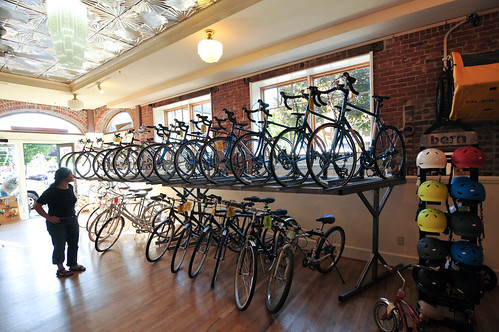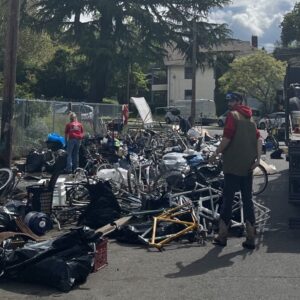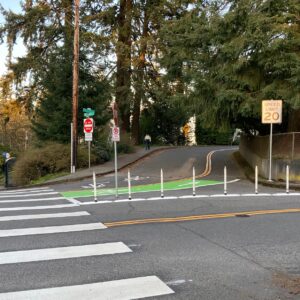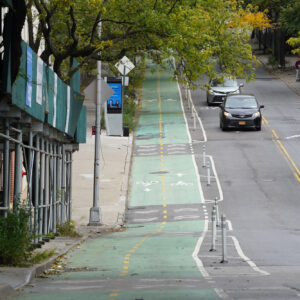
(Photo by J. Maus/BikePortland)
Should advocates for bicycling consider retail bike shops as something more than just a place to hang out and buy stuff? What if we thought of them as being so imperative to the cycling revolution that we fought for them and promoted them with as much urgency and fervor as a major piece of new bike infrastructure?
That idea was pitched by Fred Clements on BicycleRetailer.com earlier this month. As the executive director of the National Bicycle Dealers Association, Clements is far from an unbiased source. Even so, I thought his idea deserved more attention. And not just because I personally love local bike shops (like, really, love them) but because Portland’s bike shop ecosystem is in a constant state of flux and Clements’ perspective might be worth keeping in mind as we watch it evolve.
Here’s the gist of Clements’ argument (emphasis mine):
“When those in the bike world think of cycling infrastructure, they usually think of places to ride. Bike paths, bike friendly roads and off-road trails are all part of the necessary network for riding a bicycle.
But there is more to infrastructure than asphalt, concrete and off-road trails. Many bicycle dealers are becoming increasingly vocal that they are infrastructure too, and that a robust future for cycling in America revolves around bike shops.
The dictionary describes infrastructure as the “underlying base or foundation for an organization or system.” By that definition, bike shops can definitely be considered as infrastructure. It’s a rare cyclist who hasn’t taken advantage of a bike shop sometime in their life for bikes, accessories, test rides, repair, service and advice.
Bike shops as infrastructure is more than mere semantics. If bike shops are infrastructure, the fight for the future of the independent dealer becomes more than a marketplace issue. If bike shops are infrastructure, the continued decline in the number of bike shops across the country is every bicycle advocate’s problem.
…
The local bike shop is fighting for its collective life versus Internet competition and the various other manifestations of the digital age. This fight is somewhat under-the-radar of many involved in bicycle advocacy because it is in the realm of free enterprise. Advocates are used to allowing the marketplace to determine winners and losers. It may now be time to choose sides.”
I recommend reading the entire piece.
One thing that strikes me about this argument is that for many years bike advocacy groups have been clamoring for bike shop owners to do more to support their work — now we have shops arguing in the other direction.
“The health and vitality of the independent bike shop is a key for future growth. The dealer’s fight is every bicycle advocate’s fight.”
— Fred Clements, NBDA
Here in Portland we’ve got what many people think is an over-saturated market when it comes to bike shops. At last count, there were about 80 bike shops in the Portland metro region — and no decline in sight. “There are so many shops!” is something I hear a lot, especially from shop owners who tell me the recent proliferation of small, “subsistence shops” is cannibalizing customers and profits from larger, more established ones.
There’s some evidence that supports this: Back in July, two of our largest bike shops: Bike ‘N Hike and Performance, closed their Portland locations. Another bike shop just over the West Hills from downtown Portland, Sunset Cycles, will call it quits at the end of October.
While these established shops have closed, many smaller shops have expanded in recent months. The Bike Commuter in Sellwood, Portland Bicycle Studio in northwest, The eBike Store near Peninsula Park, Gladys Bikes on Alberta, and Upcycles in Woodlawn have all recently moved into larger spaces. And we’ve seen no slowdown in openings of new shops like Cat Six and Hi-5 Bikes.
Portland bike shops are extremely diverse and the impact of the Internet on their bottom line can be hard to quantify. We have very well-established online retailers with large brick-and-mortar locations (like Western Bikeworks and Universal Cycles) and we have a more traditional bike shop, Bike Gallery, that offers an “online catalog.” And then there are dozens of other permutations: from a tavern and community event space (Velo Cult), to a tiny, service-focused business located in an old school bus (Black Bird Bicycle Repair).
All our shops offer something distinctive and they all play an important in making bicycling better in Portland. While I don’t feel our shop scene mimics national trends, I’ll keep Clements’ argument in mind as our local landscape continues to change.
What do you think? I’d especially love to hear from professional advocates and shop employees.







Thanks for reading.
BikePortland has served this community with independent community journalism since 2005. We rely on subscriptions from readers like you to survive. Your financial support is vital in keeping this valuable resource alive and well.
Please subscribe today to strengthen and expand our work.
I read the entire article and I didn’t see one one suggestion of what actually to do and by who (perhaps other than to spend money at your LBS rather than buying through the internet). What would this “support” look like and who would it come from? Maybe I missed it. Anyone?
thanks for mentioning that Matt. I was actually going to write “What would this look like?” at the end of the article. So to answer the question… I think it could be obvious stuff like advocacy/community groups working more closely with shops on promotions, events, and so on. But on a larger scale… if we take Clements’ urgings literally… maybe it’s a matter of advocates working to help local shop owners apply for loans/grants and helping them get a seat at business association tables in City Hall and so on.
What I think is most exciting about bike shops in Portland is that the successful ones are each trying to specialize in some. The one’s you listed as expanding all have found a niche, the ones that really failed at that have had to move out.
To survive you have to be more than a bike shop, you have to be a community hub. Velo Cult is a great example. I’d love to see all bike shops also have a beer component 🙂 At Go By Bike we bring our service right to the customer with same day service and provide free valet.
What if instead of spending $4 million on bike share we gave money to all our 80 bike shops to offer a super low cost day bike rental service? Much like the OV-Fiets in the netherlands. We would have 80 stations requiring no maintenance and it would help our local shops attract customers.
Rentals from bike shops and bike share are very different. While cheaper bike rentals are a nice idea, Splinlister.com already makes it possible for individuals to rent out their bikes for whatever price they chose, and many bike shops do offer rentals, but you have to pick them up and return them during business hours.
Bike share requires an initial start-up cost, but advertising + memberships can pay for ongoing maintenance in many cities, while providing a totally different service: a network of public bike sharing locations on the streets all over the central city, available 24/7.
I imagine all the bikes being the same and being the same price. You would do day rentals instead of hourly and they could be returned to any shop in town. The sponsorship would pay for bike replacements and redistributing bikes. In the Netherlands I believe it is around $5 for a day rental. This would also allow people to pay cash and get a person giving advice about how to ride around town.
Not to be too simplistic, but it’s event promotion, stupid! No Bike Gallery?
No Cycle Oregon. No Sellwood? Less cyclocross. Bike shops are the multiple beating hearts of a cycling community. Be cheap and shop with Amazon at your own peril.
Yes there are a lot of bike shops in Portland…back in 2007 the last time I did a population to shop ratio evaluation it was like 1:4000 vs. 1:40,000 in Vancouver City Limits.
So now with 80 shops( vs. the 60ish I counted then) one could definitely say that there should be greener fields out in the surrounding bike friendly adjoining cities. Or perhaps even east of 205 within the City.
The other aspect may be developing niches to offset your overhead with a higher value/ higher demand product: coffee (done), beer (done), etc. as developed in this market within the last 6 years.
One area that has been missed would be a late night bike shop…like the late night pharmacies in N. Europe. There are a lot of times I wish I could pick up an item or drop off a bike or pick up a specialized widget when I do not have to take time off from work, etc. There are the weekends to do this, true…but that is my riding time 😉 if I am not working or spending time with family. Perhaps if one shop does not fill this void, then there could be shops that rotate this service on an agreed upon cycle per quadrant of the city.
Yes, there are holes in the Metro area bike shop map. The Milwaukie bike shop ratio is 0:22,000
Universal Cycles on E. Burnside opens at 6am during the week (8am on weekends) and has just about any bike part you could ever want/need!
Man. A late night anything (besides bars)would be welcome in this town!
I will definitely frequent the late night bicycle, pie and coffee shop.
A thing that I saw in the Netherlands outside a bike shop was a vending machine for use after hours. You could buy a patch kit, blinky lights, tubes, tire levers, etc.
I was thinking just the other day that it would be cool if 7-Eleven carried those little strap on blinky lights. When after dark, or your light failed at night you knew you could get one of those to get you home.
Don’t they have one of these in front of the Green Zebra?
If Hollywood is convenient to you, VeloCult on NE 42nd is open until 10 pm every night. The lights may be dimmed and there might be a band playing, but they’ll also be open for business as a bike shop.
And, as noted, Universal on E Burnside opens at 6 am on weekdays.
So that’s 16 hours out of 24 that you can get bike stuff!
just have advocacy groups remind everybody that your butt, hands, feet and head will all be more comfortable if you shop at a LBS instead of chasing deals on the Internet… An epiphany I had when some guy at River City measured my sit bone width with some memory foam. I was like, “hey there’s two widths of saddles here, how do i know how wide my ass is?” and he was like, “I’ll show you how wide your ass is.”
I like this small-shop mentality, and I think it may also apply in other industries. Small-grocer (green zebra), small-restaurant (food carts), and small-movies (neighborhood theaters) are all vital pieces of the Portland neighborhood experience.
Not sure I’d count Green Zebra just yet. Canceled in Woodstock due to a larger store moving in, and Division isn’t moving very quickly.
There is the challenge on the flip side for bike shop owners/ managers…we as communities should also be careful to not thrust upon bike shops the role of a community center or “third place” too heavily.
If a mechanic has to play the role of social service provider for every third or fourth person who walks into the door…no wonder why retail shop rates are now ~$70 per hour (versus what the mechanics take home pay is…~$14 per hour). There is a lot of customer time that may be eroding this transfer of staff time to wrenching/ income creation time. (I doubt most bike shop owners are retiring early AND rich.)
Bike shops have numerous ways to build brand loyalty, such as offering a bike commuter package that provides a discount for an annual maintenance agreement. My bike is also in need of seasonal upgrades, such as fenders and lights this time of year. What I don’t need is to be ignored since I don’t cyclo-cross, drive a car, don’t ride every day. In general, only 20% of the bike shops in town offer fair or better customer service, and they get my repeat business. Prioritize service, develop new offerings, and demonstrate how to ride safely in the city to engage the community and stay connected year round.
of course we need local bike shops…
what would drivers do if they didn’t have all these specialized auto repair places? or gas stations? they’d pay premium dealer prices for repairs and high fuel costs due to supply, and they would drive less…
so as a bicycle rider I’m very happy to have Meticon within walking distance and numerous food carts to fuel up with a burrito… I need that 3rd-party infrastructure to support my cycling…
Since a good or bad bike shop experience can have a significant effect people’s decision to ride or not, it behooves us to encourage and support good shops as a point of entry into both utility and recreational riding. I think transit proximity is also a useful thing, if you multimode commute having a shop near you transit line is a convenience when something happens to your bike during your commute.
If I need bike stuff during the week, I’m going to jump off the MAX at Beaverton Central and go to Bike Gallery or Performance because they are right next to the station.
Talk up the good shops, “like” and “share” their posts on Facebook, etc. If a shop supports the local mtb scene in some way, they get my business every time. Fortunately, many shops in PDX do just that so I have to spread my $ around.
I’ve gotten great service and fair prices at Joe Bike, Seven Corners, A Better Cycle, Bike Gallery…I think we’ve got it pretty good. I’m very excited and willing to talk to shops about promotional ideas – I’ve often wondered if local shops could join forces to make their pie bigger. Owners are often mechanics, bookkeepers, interior designers – I imagine it’s challenging to find time to do innovative promotion on the side. I think local shops could play a huge part in moving us toward the dream of two bikes in every garage. What if every shop had a social bike club that competed with the rest to see which could put on the best ride? This town really needs a way for bike-lovers to recruit people who don’t yet ride bikes.
Clements certainly has a bias, but I think there’s a grain of truth. The “community of cyclists” needs retailers as much as the retailers need the community. When we have good shops who don’t hesitate to support us, they benefit as well.
Performance isn’t a bike shop, which is exactly why the downtown location closed. I’m just saying.
The best shops act as infrastructure by creating a climate that encourages new riders to ride around town for commuting/utility and keeps existing riders riding by validating their choice through praise, and assisting them in gear selection to make the ride easier. I imagine it would be difficult to figure out this whole bike commuting thing if a novice wasn’t able to go into one of a dozen great shops in the market and get practical advice tailored to their situation from a mechanic or salesperson who truly cares about getting more people on the road and making it an enjoyable experience.
Problems in the bike industry amount to a very long list.
I was in the middle of it for almost 20 years as a mechanic, salesman, and even a manager at 2 of the many shops I worked for. Sadly, bike shops are often their own worst enemy.
They pay nothing, for starters. Shop owners ultimately trust your bike’s function and your safety to cheap and very inexperienced staff. I used to spend my days double and triple-checking the work of newbies who may or may not have completed UBI’s 2-week course. Real mechanics – those with 5+ years behind them – being too expensive and too likely to take an extra five minutes to make a repair perfect, shop owners tend to opt for the cheapest help. Owners often couldn’t tell the difference because they frequently hadn’t worked in a bike shop until the day they owned one.
Customers notice. Whether you know what it is you’re experiencing or not, you know something is off at those places. I had a customer tell me one day that he was really confused – and a little concerned – that I was the only wrench out of the 4 on staff that could solve his very simple problem. The fact is that there is a lot to know and a lot to pay attention to. It IS a technical job. It IS skilled labor. It also pays less – on average – than Baskin Robbins.
If you rely on someone else for any of your mechanical work, you eventually find yourself loyal to a mechanic, rather than the shop that mechanic works for. Some career mechanics find themselves with a small customer base that follows them from one shop to the next. Some of mine still show up in my shed, Di2 in one hand, taco-shaped wheel in the other, offering cash for services yet to be rendered. But I’m not a bike shop. The manufacturer won’t offer warranty service through me. I do the work with a smile on my face. I’ll likely never own a bike shop simply because nobody who does the job can ever put away enough savings to start a shop of their own. That doesn’t mean I’m not really fwking good at the work and it sure doesn’t mean I’ll say no to someone asking for my help and offering reasonable compensation.
Then there’s the ever present split-personality shop owner who whines about making no money and then gives a random, unsolicited discount to a customer who a) makes more annually than everyone in the shop combined, and b) couldn’t care less about the $200 he just saved. The same owner, of course, will flip out when a savvy employee gives a lesser discount to get a dead product out the door . . .
The industry at large is worse. If your only image of driving was a formula one racer in a flame-retardant suit and crash helmet barreling down the road at 600mph, would you rush to the dealership to drop $400,000 on a Ferrari? Would you think for even a second that the relatively affordable Honda Accord elsewhere on the same lot would meet your needs effectively? What if you DID decide on the Accord? Would you think it made sense that the pedals required special shoes and the seat was so uncomfortable that you would need driving shorts that were plastered with industry logos? Would you pay extra to have a cup-holder installed?
Marketing. Thank you, bike industry. Thanks to your marketing department, I now know that to be a “cyclist” I should own a road bike, a cx bike, gravel bike, TT bike, Aero road bike, Hardtail MTB, DH bike, Enduro Bike, Full-Suspension XC-bike, Single-speed MTB, and something called a “fixie” all in addition to my daily driver – a ridgid mountainbike with slicks, fenders, rack, and lights.
Products nobody can use. $15,000 “Halo Bikes”? FWk off. As long as the bike industry spends the majority of its resources pushing product that only a small minority can afford or even find the least bit useful, it deserves to fail.
I’m really not convinced that anyone deserves the help of the non-profit sector when they’re primarily suffering the results of poor business decisions.
I think a key detail of bike shops functioning as infrastructure is bike shops that meet a diversity of rider needs. I’ve been helping my parents, who live in a small town, look for bikes. Even though they live in prime mountain biking country with plenty of sport-oriented bike shops the closest shop that has capacity to set up a pair of 70-year-olds on step-through city bikes is 400 mi away.
Magic Hat hits many of the issues I can think of.
If you equate the bike shop to the automobile world where you have dealerships and mom and pop repair shops. I’d like to think that one day bike shops can get to that place. You can go to a “dealership” to get everything done, sure it will cost more, and maybe the turn around won’t be so quick. Then maybe we can evolve into the “mom & pop” (AKA Vinnie’s Cycle Repair or something like that) where you go to get your bike fixed. Lower overhead, usually quicker turnaround, and perhaps somebody who specializes in a certain market. PDX is the closest I have ever seen that. My old hometown has 2 shops in it at the moment. 1 multi-location shop, bikes only, the 3 big brands all sold in one place. The other, a long standing one off that switches to snow sports in the winter, has a few long term employees and sells one of the big 3.
The biggest issue for me is there are only a handful of bike mechanics I would actually trust to touch my bike. 2 of them no longer work in the industry since they got much better paying 8-5pm M-F jobs. That is probably my biggest agreement with Magic Hat. Just because you know how to turn a wrench doesn’t mean a lot of these guys know what they are doing.
When I first got into cycling back in 1989, the first thing I was told by my cycling friends was “learn how to work on your own bikes”. It saves time, money, and often times a lot of stress.
That’s going to be the biggest difference between cars and bikes. Many cyclists eventually learn enough to do many (or even most or all) of their own repairs. I don’t think you see this in cars as much any more. Sure there are still some weekend wrenches out there, but the vast majority of people don’t have the skills, know how or more expensive tools to deal with most auto problems. On the other hand a decent set of bike tools can be obtained for $200.
I’m in a mid to lower income bracket now (in school) and do almost all of my own repairs, because i don’t have the money to use a shop, I like working on my own bike, and I don’t have to wait for a 1-2 week turn around.
I understand most of the comments on here, but I would argue that for many cycling encourages and even breeds a certain level of independence that likely bleeds over into many cyclists working on their own bikes.
Many bike Enthusiasts learn to do many of their own repairs. A lot of car enthusiasts do the same. However, most people who get on a bike to ride from A to B are about as far from enthusiasts as you get.
Most people aren’t self-described “cyclists”. They may have only spent $200 on their whole bike. You can’t convince them to spend $40 on a rechargeable headlight, let alone $200 on tools. They need help with their bike when something goes wrong.
The most rampant problem I see in the bike industry is that assumption: everyone who rides aspires to do Gran Fondos, Cycle Oregon, and/or the Oregon Enduro series – and that just ain’t so. This is the blindness of product development, marketeers and numerous Bike Enthusiasts. People who ride bikes, but aren’t “cyclists” are invisible on the marketing scope.
Great points.
Of course bicycle shops are part of the infrastructure. So are potholes–and traffic signals that can’t be tripped by people on bicycles. It’s not that big a deal.
But in the absence of extra-market forces, for-profit bicycle shops remain part of the infrastructure only by offering the kinds of value their customers are willing to pay for.
If they cannot do that, whether from a lack of expertise, capitalization, competitiveness, customer empathy or market knowledge, they cannot hope to succeed in any sustainable way.
As long as people are free to make choices, it makes little difference that someone in the bicycle shop business believes that bicycle shops should be supported by customers (or advocates, or government).
But it makes all the difference if customers of those bicycle shops believe the shops support them.
Bicycle shops that thrive, do.
Many Bravos for this, MH! I’ll add, many shop personnel are hired via the horrid superstition of “hire the attitude, teach the skill.” No, you hire the skill and raise pay or share authority until you get the attitude you want!
This is ridiculous. The only people who care about local bike shops are hobbyists — that is, people who spend a lot of time thinking about bikes. They’re the same as the people who love local stereo shops, local camera shops, local watch-repair shops, etc. (I belong to all four of those groups, by the way). But we really need to move cycling beyond the hobbyists — to make it an easy, convenient transportation choice for people who don’t particularly care about the machines in themselves. In a mass-cycling world, specialty local bike shops will do just fine (as specialty performance-oriented car shops do just fine for car hobbyists right now) and the mass market will demand what it needs in both retail and repair.